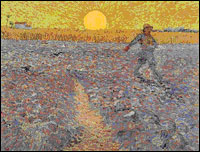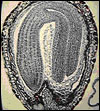 |
 |
Home | Contact |
 |
 |
 |
|
Part III B continued
In the Parable of the Sower, "…the seed is the world of God…" (Luke 10:11). The seed remains the constant. The soil that the seeds fall into remains the variable. Good soil equals good fruit. Bad soil equals bad fruit. It is in Matthew 13:10-13, which Jesus Christ points out that the aspect of recognition is based upon a certain resonance. "And the disciples came, and said unto him, Why speakest thou unto them in parables? He answered and said unto them, Because it is given unto you to know the mysteries of the kingdom of heaven, but to them it is not given. For whosoever hath, to him shall be given, and he shall have more abundance: but whoever hath not, from him shall be taken away even that he hath. Therefore speak I to them in parables: because they seeing see not; and hearing they hear not, neither do they understand." Whereas in Mark 4:11-12, Jesus states that once a person becomes converted (turned around), their sins become forgiven.
Even though our vision has been deliberately obscured, Jesus states that only those few souls with the 'ears to hear', will hear the wisdom as well as the truth contained within parables. "But he that entereth in by the door is the shepherd of the sheep. Apparently, the qualities of recognition and resonance form a two-way street. It would appear that God's dice have remained loaded throughout time. The paradox appears to be that only those souls with the 'eyes to see and the ears to hear', will be able to see and hear anything. As long as we continue to sleep, psychologically, we are deaf, dumb and blind idiots unable to see, much less digest any higher impressions. We have to wake up before we can perceive the various levels of real objective truth or art which surround us. The principle at hand teaches us that we must be awake to hear or see the various higher influences within our selves. The paradox is that no one emerges into this life fully awake. Our Work aim must always be to cleans the lens of our own perceptions. Once we begin to see beyond our own personalities to the underlying patterns, processes and purposes within, we become able to see and hear the content of the real objective world. For those students who are teachable, Real Objective Art remains a directional form, a beacon of hope for those who are already on their way. It's easy to become lost in life. Real Objective Art reorients our souls towards the next spiritual task at hand. "Until a man uncovers himself, he cannot see." Gurdjieff
|
|
|
|||||||||||||
| Sitemap |
|
|
|
|
|
|
|
|
|
|
|
|
|
|
|
|||||||||||||
© 2006 Sojourner Institute, All rights reserved
 And he spake many things unto them in parables, saying, Behold, a sower went forth to sow; And when he sowed, some seeds fell by the way side, and the fowls came and devoured them up: Some fell upon stony places, where they had not much earth: and forthwith they sprung up, because they had no deepness of earth: and when the sun was up, they were scorched; and because they had no root, they withered away. And some fell among thorns; and the thorns sprung up, and checked them:
And he spake many things unto them in parables, saying, Behold, a sower went forth to sow; And when he sowed, some seeds fell by the way side, and the fowls came and devoured them up: Some fell upon stony places, where they had not much earth: and forthwith they sprung up, because they had no deepness of earth: and when the sun was up, they were scorched; and because they had no root, they withered away. And some fell among thorns; and the thorns sprung up, and checked them: And he said unto them, Unto you is given to know the mystery of the kingdom of God: but unto them that are without, all these things are done in parables.
That seeing they may see, and not perceive; and hearing they may hear, and not understand; lest at any time they should be converted, and their sins should be forgiven them. (Mark 4:11-12)
And he said unto them, Unto you is given to know the mystery of the kingdom of God: but unto them that are without, all these things are done in parables.
That seeing they may see, and not perceive; and hearing they may hear, and not understand; lest at any time they should be converted, and their sins should be forgiven them. (Mark 4:11-12)
